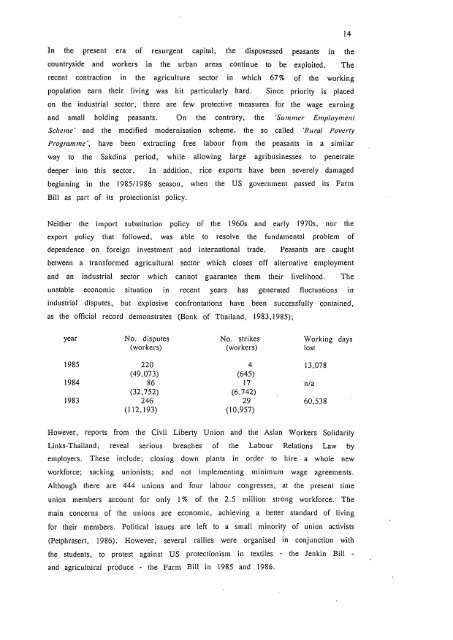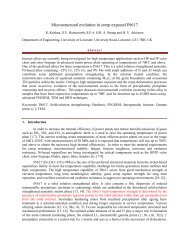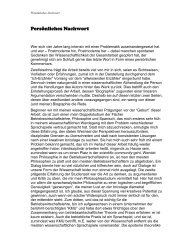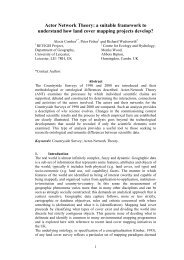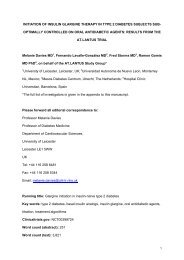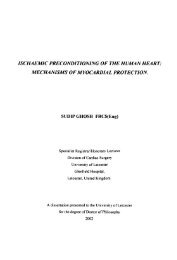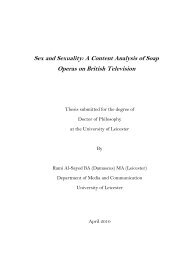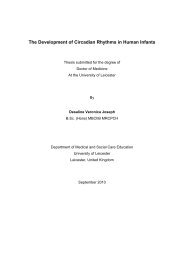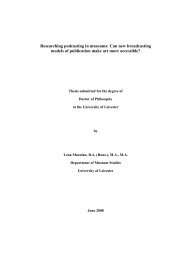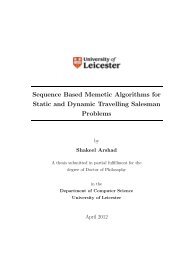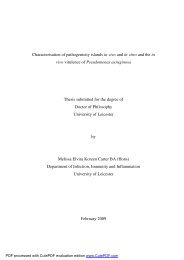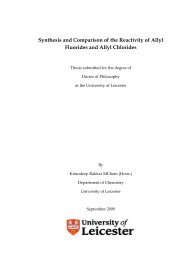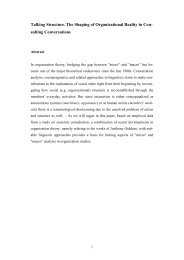- Page 1 and 2: RADIO IN A TRANSITIONAL SOCIETY: TH
- Page 4 and 5: Chapter 1 1.1 I .2 Chapter 2 2.1 2.
- Page 6 and 7: Chapter 8 8.1 8.2 8.3 Chapter 9 9.1
- Page 8 and 9: List of Figures Figure 1 The Admini
- Page 10 and 11: Our inquiry therefore, is a small a
- Page 12 and 13: 4 --- First we begin with an apasis
- Page 14 and 15: 2.1 Introduction CHAPTER 2 MODERN T
- Page 16 and 17: labour' either worked their own lan
- Page 18 and 19: In the urban areas, the US military
- Page 20 and 21: US, Japan and Europe. Between 1974
- Page 24 and 25: 2.6 A Chronology of Events, 1932 -
- Page 26 and 27: US government cut military aid to a
- Page 28 and 29: on the other, it undermined the sub
- Page 30 and 31: This was not the first time that th
- Page 32 and 33: The cardinal position of the monarc
- Page 34 and 35: 3.2 Nationalism and Militarism; Con
- Page 36 and 37: In the Thai language the word for '
- Page 38 and 39: Reforms designed to 'modernise' the
- Page 40 and 41: Development Plan (1961-1966), serve
- Page 42 and 43: 3.3 Paternalism and the Emergence o
- Page 44 and 45: With Prem as the father figure (dub
- Page 46 and 47: development of capitalism has trans
- Page 48 and 49: democracy they were hostile to gove
- Page 50 and 51: However, since the civilian governm
- Page 52 and 53: egion total(%) Bangkok Central Nort
- Page 54 and 55: the power of allocative control wou
- Page 56 and 57: emained unfulfIlled. There were lar
- Page 58 and 59: decisions used to secure the audien
- Page 60 and 61: Restrictions on programme content w
- Page 62 and 63: "Radio advertising is very cheap. A
- Page 64 and 65: Although the emergent music industr
- Page 66 and 67: million). This enabled it to expand
- Page 68 and 69: In addition, the quantity of media
- Page 70 and 71: editorial and advertisement. Commer
- Page 72 and 73:
O — V. '-'I C-.)- V- It) -V b1 I-
- Page 74 and 75:
ai C L I-. 0 L 0 H U 0 0 L 0 H 0 U
- Page 76 and 77:
5.1 The State and Media Production:
- Page 78 and 79:
Pua Pandin Thai shares similar ideo
- Page 80 and 81:
The closed form of the Sunday sermo
- Page 82 and 83:
5.2 The Production of News and Curr
- Page 84 and 85:
After the downfall of the military
- Page 86 and 87:
presentation. On AIvl radios, these
- Page 88 and 89:
Table 7 The Structure of Programme
- Page 90 and 91:
The routine of Kao Si Mum Baan begi
- Page 92 and 93:
commercial success, and the fact, a
- Page 94 and 95:
Table 8 A Summary of the Structures
- Page 96 and 97:
the theatre as well as from the civ
- Page 98 and 99:
How then can a declining industry n
- Page 100 and 101:
Phibun's military patronage, music
- Page 102 and 103:
a more cautious strategy. Since it
- Page 104 and 105:
The drama companies submit one-page
- Page 106 and 107:
Monthly salary - Main actors - Dire
- Page 108 and 109:
The production of popular music in
- Page 110 and 111:
exaniple, goes out into the country
- Page 112 and 113:
A small number of singers, such as
- Page 114 and 115:
the case of Grammy we do see a more
- Page 116 and 117:
or diversity in programming. Noneth
- Page 118 and 119:
Music programmes for example, are a
- Page 120 and 121:
political power is now on the decli
- Page 122 and 123:
of the sermons dealing with social
- Page 124 and 125:
In this sermon, civil servants are
- Page 126 and 127:
Through these programmes the milita
- Page 128 and 129:
Kampuchea and constantly ambushes v
- Page 131 and 132:
The military argues that it is the
- Page 133 and 134:
The rigid divisions that operated i
- Page 135 and 136:
are sometimes present in the same p
- Page 137 and 138:
"The Japanese PM won the election a
- Page 139 and 140:
"Parliament is no! an arena for rev
- Page 141 and 142:
forms. Nonetheless, it contradicts
- Page 143 and 144:
A second politku problem is posed b
- Page 145 and 146:
PART ONE: THE FINAL PLANNING OF THE
- Page 147 and 148:
In this rationalisation the author
- Page 149 and 150:
and her courtly speech are always s
- Page 151 and 152:
CHAPTER 8 DRAMATISING MASCULINITY A
- Page 153 and 154:
Sua is trained in a male dominated
- Page 155 and 156:
generally within the adventure form
- Page 157 and 158:
which carry the two themes simultan
- Page 159 and 160:
TOH: "Sua, you have succeeded... ev
- Page 161 and 162:
Sua Term is depicted as the hero's
- Page 163 and 164:
logging franchises in Laos and Burm
- Page 165 and 166:
"... My father wan Is me to have an
- Page 167 and 168:
The final way in which the film and
- Page 169 and 170:
the story, and not least by his bes
- Page 171 and 172:
KANITA: "(whisper) No sweat, physic
- Page 173 and 174:
CHAPTER 9 PRIVATISING SENSUAL PLEAS
- Page 175 and 176:
ealistic lyrics. Pleng Luktoong bor
- Page 177 and 178:
consumption. The following advertis
- Page 179 and 180:
Luktoong lyrics: resistance and acc
- Page 181 and 182:
worldview with the traditional inst
- Page 183 and 184:
When the balance is struck the song
- Page 185 and 186:
prevails. These songs juxtapose the
- Page 187 and 188:
These pre-emptions are however, ove
- Page 189 and 190:
Ah, ha, cutie, so handsome Whose lo
- Page 191 and 192:
This track reproduces the style of
- Page 193 and 194:
the album. They are juxtaposed with
- Page 195 and 196:
9.3 Luktoong Music Radio: DJs and C
- Page 197 and 198:
Programme of Luktoong Artists -Adve
- Page 199 and 200:
month or approximately £25)6 with
- Page 201 and 202:
'Pleng Hit Pua Kizun': DJs and the
- Page 203 and 204:
traditional popular sport that is b
- Page 205 and 206:
It is in this final slot, where the
- Page 207 and 208:
The field research The field study
- Page 209 and 210:
The second problem arises from the
- Page 211 and 212:
small dinning hail (which seats abo
- Page 213 and 214:
Category I Accommodation 2 Food 3 C
- Page 215 and 216:
positions, though some of their act
- Page 217 and 218:
The Unionisation of the Aporn Texti
- Page 219 and 220:
". .we can 'I bear the house-keeper
- Page 221 and 222:
after her predecessor resigned, the
- Page 223 and 224:
einforce alternative spaces by inte
- Page 225 and 226:
A collective biography All of the n
- Page 227 and 228:
drama and the prime-time soap opera
- Page 229 and 230:
In the factory, the workers are abl
- Page 231 and 232:
pointed out, "a tragic ending is to
- Page 233 and 234:
of the story however. One responden
- Page 235 and 236:
(1) "1 wonder if they are from Kora
- Page 237 and 238:
sung among the women workers and on
- Page 239 and 240:
On the first anniversary of the Uni
- Page 241 and 242:
ealist narrative were rejected. As
- Page 243 and 244:
(B) "Now, there are well wishers wh
- Page 245 and 246:
In this manifestation of symbolic p
- Page 247 and 248:
CHAPTER 11 CONCLUSION The aim of th
- Page 249 and 250:
11.2 Cultural Mediation and The Lim
- Page 251 and 252:
occured within the workers themselv
- Page 253 and 254:
Bibliographies Adorno, T. and Horkh
- Page 255 and 256:
Chaloemtiarana, T. (1976) "The Evol
- Page 257 and 258:
Huncharoen, C. (1983) "Panha karn K
- Page 259 and 260:
Murdock, G. and Janus, N. (1985) Ma
- Page 261 and 262:
Rajakool, C. (1984) The Social and
- Page 263:
Volosinov, V. (1973) Marxism and th


